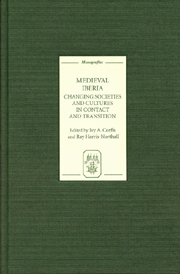Book contents
- Frontmatter
- Contents
- Acknowledgements
- Introduction
- Part 1 SOCIAL AND CULTURAL MINORITIES IN CHANGING SOCIETIES
- Part 2 CONTACT AND CONFLICT: PERSPECTIVES ON HISTORY AND CULTURE
- Visigoths and Asturians Reinterpreted: The Spanish Grand Narrative Restored?
- Against the Arabs: Propaganda and Paradox in Medieval Castile
- Conquest and Conversion in the Hispanic Chivalric Romance: The Case of Reinaldos de Montalván
- Part 3 TRANSMISSION OF LEARNING AND TEXTS IN CHANGING CULTURES
- Part 4 LINGUISTIC CONTACT AND CHANGE
- Index
Visigoths and Asturians Reinterpreted: The Spanish Grand Narrative Restored?
from Part 2 - CONTACT AND CONFLICT: PERSPECTIVES ON HISTORY AND CULTURE
Published online by Cambridge University Press: 12 September 2012
- Frontmatter
- Contents
- Acknowledgements
- Introduction
- Part 1 SOCIAL AND CULTURAL MINORITIES IN CHANGING SOCIETIES
- Part 2 CONTACT AND CONFLICT: PERSPECTIVES ON HISTORY AND CULTURE
- Visigoths and Asturians Reinterpreted: The Spanish Grand Narrative Restored?
- Against the Arabs: Propaganda and Paradox in Medieval Castile
- Conquest and Conversion in the Hispanic Chivalric Romance: The Case of Reinaldos de Montalván
- Part 3 TRANSMISSION OF LEARNING AND TEXTS IN CHANGING CULTURES
- Part 4 LINGUISTIC CONTACT AND CHANGE
- Index
Summary
Spanish history, like a good many others, has often been made the subject of a Grand Narrative of national identity, historical purpose and religious mission. Aspects of this understanding have varied, most notably between liberal nationalists and Catholic traditionalists during the nineteenth century, but for long it constituted a sort of Spanish ideology of the past. The Grand Narrative first began to be questioned in the mood of pessimism that gripped a part of the thinking of late-nineteenth-century Spain, even before 1898. Thoroughly rehabilitated and restored by Franco, it began to be yet more decisively rejected in the era of democratization and federalization that followed the dictatorship. The political and ideological deconstruction of the Spanish nation which this produced has in turn provoked an intense debate during the past fifteen years – probably the most intense ongoing debate in any Western country – which shows no sign of abating.
In the 1970s critics held that the formation of historically continuous Spanish institutions in the kingdom of Asturias during the generation immediately following the Muslim conquest involved a major paradox. The most succinct statement of this position was made by Barbero and Vigil Pascual in the small study they published in 1974, Sobre los orígenes sociales de la Reconquista. This work appeared on the eve of the democratization of Spain, and for this particular topic represented a climax of the deconstructive trend of interpreting Spanish history, which had begun in the late nineteenth century.
- Type
- Chapter
- Information
- Medieval IberiaChanging Societies and Cultures in Contact and Transition, pp. 47 - 56Publisher: Boydell & BrewerPrint publication year: 2007



